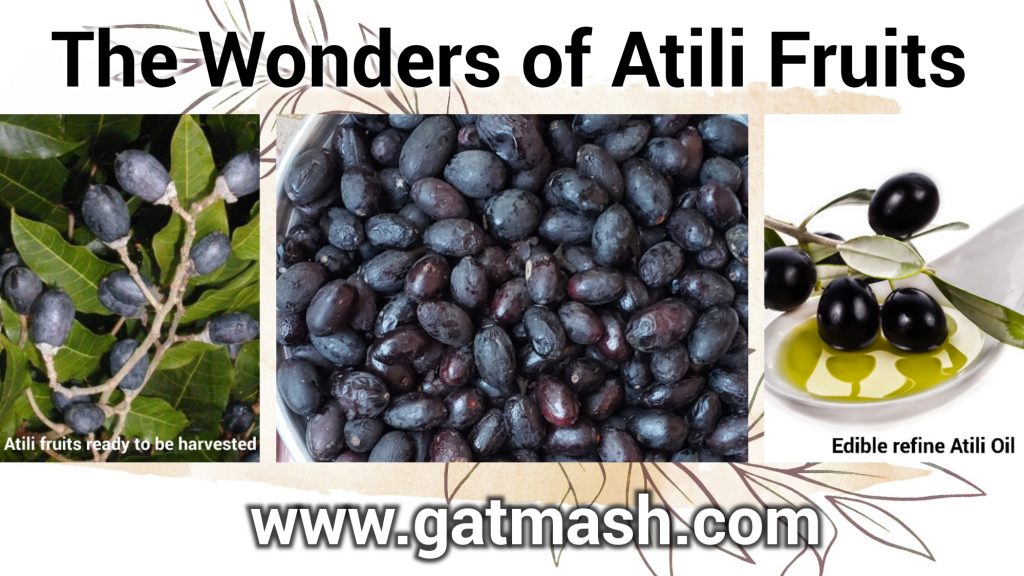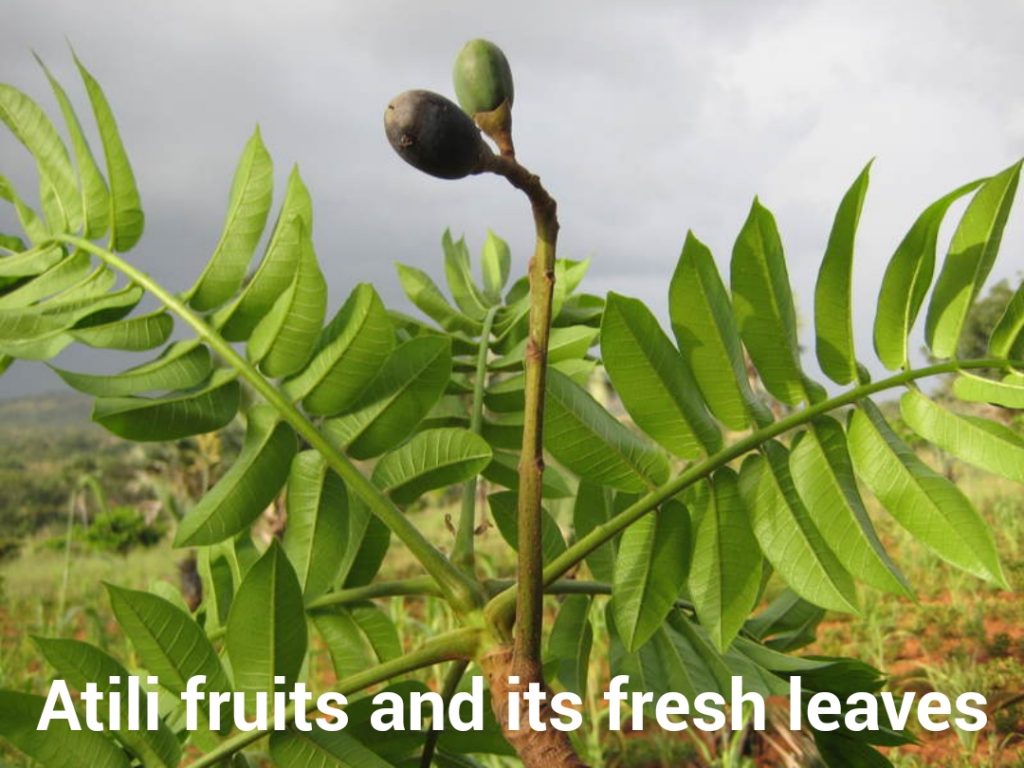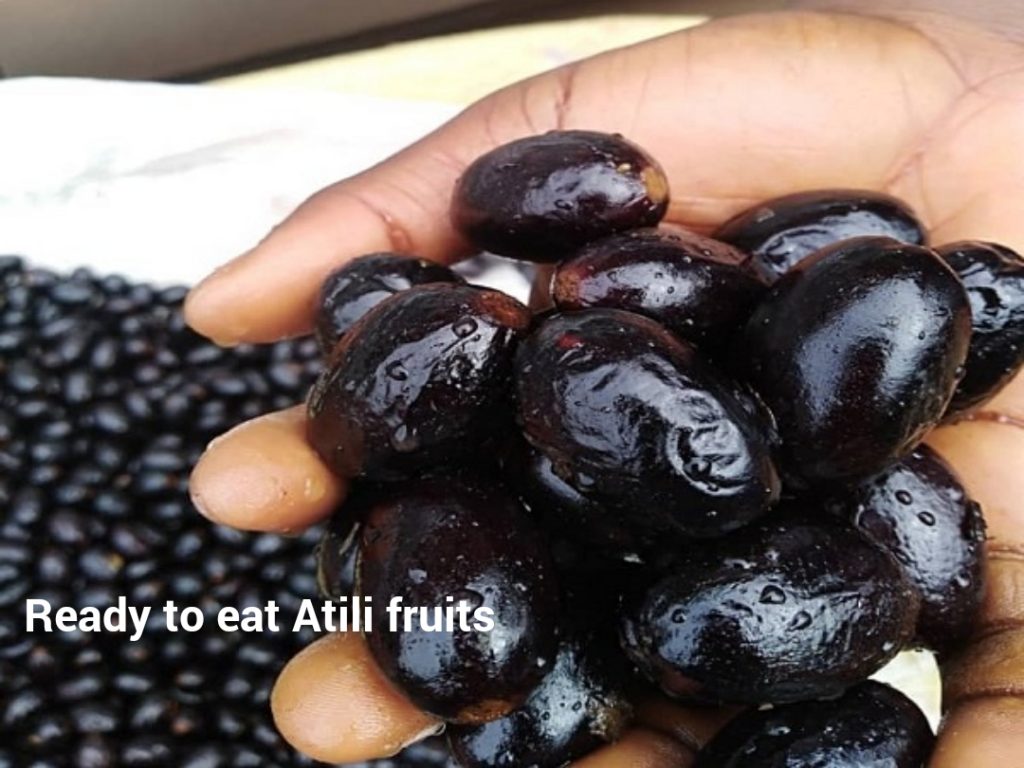
Atili! Atili! These shouts rent the air as one enters the cold beautiful city of Jos, Plateau State, Middle Belt, Nigeria. You begin to wonder what these small dark-colored things are. Atili fruit looks like smaller specie of ‘Ube’ (in Igbo Language). Atili is a unique local pear found in North-Central and some parts of North-Eastern zones of Nigeria and it tastes fantastic. As a first timer coming into Plateau State from any of the neigbouring states, you will come face-to-face with this small, sweet, black pears loaded in baskets or tray on the heads of women parading the streets of Jos, hawking the fruits, moving in between traffic, chanting ‘Atili’!
The Black Olive popularly called Atili in Hausa Language, (Botanically as Canarium Schweinfurthii, family of Burseraceae) is the fruit of the perennial tree plant also known as Atili tree. The fruit is predominantly found in large quantity in Pankshin, Langtang, Shendam Local Government Area, Plateau State of Nigeria. The plant produces its fruits in the rainy season (usually) between the months of April and September. The flowers grow in clusters at the end of the twigs and are small and dark green in colour. The fruits which are of two varieties-long spirals and short round in shape develop from the flowers. The fruits contain single triangular-shaped seed with small projections at the three edges. The seeds are embedded in a purplish green pulp with a desirable sweet but not too sugary taste similar to that of avocado pear. The pulp is of oily consistency, edible and delicious.

The Black Olive (Atili) is a dark-purple drupe characterized by a hard edible outer body and solid seed. Grown as a tree, this remarkable plant is outstanding and unique in its own design. It is grown in African countries such as Nigeria, Ghana, Tanzania, Angola, Uganda, Senegal, etc. In my recent visit to Jos, popularly referred to as J Town, I ate a lot of it but many people are yet to discover the hidden treasures in atili fruits. Atili fruit, the ‘oil-making tree,’ is greenish in colour at formation, before it later changes to an ashen colour as it is getting mature, before finally turning oily-black, which is the sign of harvest and consumption.
The utility of atili can be likened to that of the palm trees because almost all parts of the atili are useful. The fruit for consumption, the strong brown seed inside is used for local droughts game, traditional divination; children use it for learning especially counting numbers for mathematics work and its oily nature, making it a good source of natural oil which is highly medicinal. Growing up amongst the Birom people in Bukuru, Jos South Local Government Area of Plateau State, I discovered that almost every family in most of the local governments in the state has an atili tree as inheritance. Just like any other plant created by God, atili has a harvest season. The people of Jarawa in Jos North Local Government Area harvest theirs from January to April; the Bassa, a Local Government Area in the North of Plateau State start from June to September while some parts of the state harvest the fruit from June to October.


PREPARATION
The unique heritage of atili to the people of Plateau State cannot be over emphasized. Apart from consumption, one can also use the atili to produce oil. When you pluck the ripe fruit from the farm, you’d steam it. Don’t cook it because if you do, it will burn. Just pour warm water over the fruit which is already in a bow and leave them for some minutes to soften. Thereafter pulp is eaten. It is from this pulp that atili oil is derived. If you need the oil, it will be poured into a mortar, and then pounded, remove the seed. After which more boiled water would be poured into the pounded one before extracting the oil.

NEXT WEEK: The Wonders of African Black Olives ‘Atili’
To be continued next week… Don’t forget to like and follow me on all social media platforms.
Theresa Moses

Journalist <> Blogger <> Publishing <> Brand Consultants <> Film/Documentary Production
Phone: +234-807-202-2024; E-mail: [email protected]; Instagram: evertess2010; LinkedIn: Theresa Moses; Twitter: @moses_theresa; Facebook: Theresa Moses





